Tribeca Interview: PHENOMS Executive Producers Mario Melchiot & David Worthen Brooks On Revealing The Human Side Of The Beautiful Game
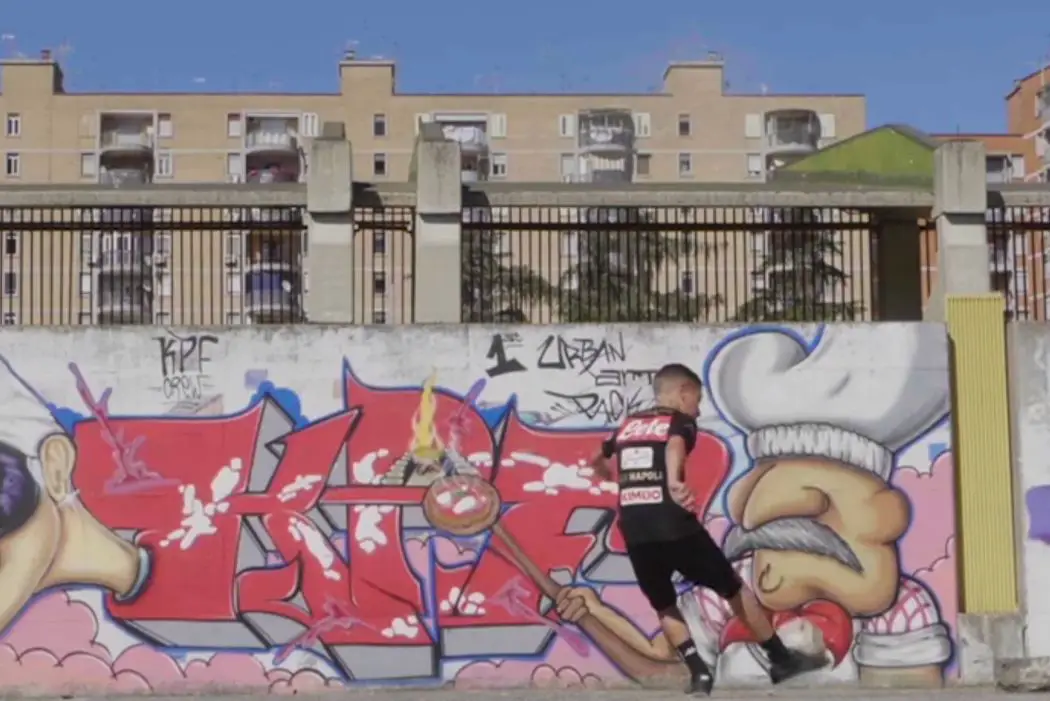
Lee Jutton has directed short films starring a killer toaster,…
As anyone who has ever looked at my Twitter feed knows, the only subject I talk about as much as film (possibly more) is soccer. So naturally, when I heard that Fox Sports would be previewing a new documentary miniseries starring some of the most exciting young talents in the game at this year’s Tribeca Film Festival, I jumped at the opportunity to check it out.
Phenoms is a five-part miniseries that gives audiences an inside look at what it takes for a young soccer player to prove themselves worthy of representing their country at the 2018 World Cup in Russia. The filmmakers followed approximately sixty young men for more than two years, chronicling the exhilarating highs and the devastating lows along the way, from suffering possibly career-ending injuries to winning league championships.
The five episodes are structured according to the positions the young men play on the field. The episode that premiered at Tribeca was “Goalkeepers,” which follows four talented young shot-stoppers: England’s Jack Butland, who suffers a horrific ankle injury and struggles to get healthy again; France’s Alphonse Areola, who must fight for the starting goalkeeper position at his hometown club, Paris Saint-Germain; Russia’s Aleksandr Selikhov, who takes a chance and leaves his small-town club, not to mention his beloved goalkeeper coach and mentor; and Uruguay’s Gastón Guruceaga, who dreams of leaving Uruguay to play in Europe but finds every potential transfer blocked by his team.
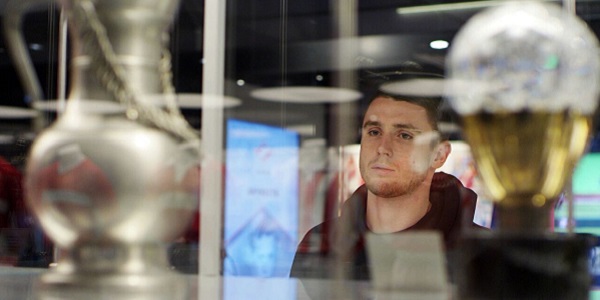
“Goalkeepers” was a beautifully shot, elegantly edited look into the private lives and struggles of professional players that we don’t often get to see. While I am a huge fan of the sport, I was not very familiar with any of these particular goalkeepers before the episode with the exception of Jack Butland, and yet by the end, I was rooting wholeheartedly for all of them to succeed. In particular, watching Selikhov catch up with his beloved mentor after he made a surprise debut off the bench in the European Champions League caused an uncomfortable emotional lump to grow in my throat. The episode served as a poignant reminder that these young men are just that — young men. Just because you get to see them play soccer on the world’s most elite stages via your television every week doesn’t mean that they are superhuman; they have hopes, dreams, and feelings just like anyone else.
My only complaint about “Goalkeepers” was that the episode was too short and ended somewhat abruptly. I would have loved to have been given at least a short epilogue detailing what the players are doing now — though of course, in the topsy-turvy world of soccer, a player’s status changes day by day. Nonetheless, if every episode of Phenoms is as good as this one, the series will be a real treat for soccer fans in the days leading up to the World Cup. In addition to the five episodes of Phenoms, the team behind the miniseries also created 15 regional specials and a feature film, set to hit theaters in June.
While I was at Tribeca, I spoke with Phenoms executive producers Mario Melchiot — a former professional soccer player who previously played in the World Cup for the Dutch national team — and David Worthen Brooks about how they chose their subjects, the effect of EA Sports on how we watch the game, and some of the most powerful moments they captured on the camera.
This interview had been edited and condensed.
There are so many promising young soccer players out there, so many countries in contention for the World Cup — how did you go about finding the right athletes for the program?
David Worthen Brooks: We started off at something that’s kind of like a film festival for young soccer players [the Toulon Tournament]. Basically, you go and watch a game and the entire bleacher is full of agents, scouts, and managers. And then there was us. So we were plugged into this community that is scouting young talent. And Mario already had a lot of connections from his professional career.
So we started putting the word out that we were looking for the next phenom in each of these countries. Lists came back. Arbi Pedrossian, our producer, was very instrumental in the initial research, and then he sat Mario down in front of YouTube clips, and then Mario said, “Yeah, that player’s good.” So it was a scouting process except, unlike a professional team, we didn’t need to have a war chest of 500 million pounds!
I imagine that a lot of these guys, if they’re in contention for their national teams, are already playing for club teams. Did you follow them around for a bit when they were with their clubs, and did any of the clubs have a problem with that? I know that sometimes they can be very worried about distractions.
Mario Melchiot: No. When you come from America and you’re a big studio, like Fox is, the clubs and the individuals are thinking they’re going to be exposed in a big way. They’re sensitive to it because they want to make sure it doesn’t become a reality thing. Those are the things I didn’t want to be a part of, being an ex-pro, so we made sure we didn’t do that. We just wanted to tell the truth and answer questions that people don’t have the answers to.
Before we started this all, we played a game on a Sunday, we did a kickabout together, and the key thing in that kickabout was, they [the producers] asked me a lot of questions.
David Worthen Brooks: The kickabout existed before Mario came along, and somebody said, “Oh, there’s a guy that works as a pundit, he might be interested in playing.” And some of us said, “There’s no way he’s going to be interested in playing with a bunch of old men.” And other people said, “But we want to win, let’s see what he can do!” [laughs]
But Mario’s influence on us completely changed our game, it changed our approach to thinking about all those things — not just on the pitch, but all those other matters that contribute to a professional player’s life. And that’s where the conversation started.
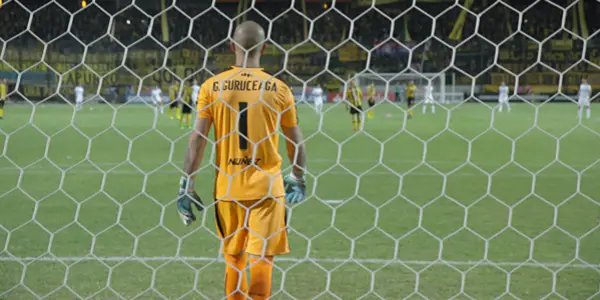
So, Mario, as a former player, I am interested to hear if there’s anything about the young generation that surprised you. Certain things that they do differently than when you were playing, or things that they have access to that make you go, “Oh, I wish we had that in my day.”
Mario Melchiot: The media is a key thing. The generation now has way more influence. Back in the day, we had to deal with journalists, and it wasn’t always what we wanted. After the game, you might want to bring out your own point of view, and we couldn’t do that because the only way to bring out the news was through the journalists. Now, the players have more control over it, because if they don’t want to talk to anyone, they use their own social platform and the news comes out that way. So they can guide it much better and say specifically what they want to say instead of someone writing something they don’t agree with. That’s the key thing going on right now, and I think it’s great for an athlete. Maybe for the journalists, it’s not so great, because they don’t always get as much content as they were looking for.
But, going back to what you said, I think that’s why there is also a lot of distraction now. Because you have so much going on. And I want to say it’s more than when I was playing, but it’s actually not a lot different because at the end the day it comes down to what you do on that green surface. And what we do [with Phenoms] is show what do you do on the green surface, as well as what do you do away from that green surface that affects what you do on that green surface. That’s our key thing, because there’s a lot of people who see the players as robots. We wanted to go beyond that and show that they have a human side. Showing the human side makes it more interesting for people to understand where they come from. And the players allowed us to come in and opened up to us.
One of the things that is really intriguing to me, as someone who watches a lot of soccer, is that you do see the human sides of the players through social media, but you also see the people who are yelling horrible things at them, like they’re robots, on social media. So I suppose those are the pros and cons of being able to express yourself that way.
Mario Melchiot: One thing that I think is very important is that when we started, we watched them and there were a lot of similarities, and I got caught up, thinking oh, it’s like this, it’s like that. But now, every individual that we have followed for so long, I want them all to succeed. Because you know why? I understand their journey ten times better than before I was watching them. Because we relate to them so much from the human aspect, I want them all to make it.
And especially at a time when the United States didn’t qualify for the World Cup, it’s a great way to introduce people players from other countries. Even if you’re not a huge soccer fan and you don’t know these players from their club teams, now you can follow their journey through the World Cup as someone new to be interested in besides Christian Pulisic.
David Worthen Brooks: Also, one thing that has really happened in the past decade is [the popularity of] the EA Sports FIFA game. There’s a familiarity with players through that game. It’s a two-edged sword. I think it was one of the Dutch players who said — this is a 20-year-old, saying this — “When I was a kid, you’d go out and be playing from first light to when it’s dark and your mother’s calling you in. And now, these playgrounds are kind of empty, because the kids are inside playing these games.” That might be something that rears its head in the upcoming years in the production line of young talent. On the other hand, because of EA Sports, there is a generation of Americans that know more about football. I first came to the States in 1984 and nobody knew or cared.
We have a special about the US team. We go into the dressing room of that critical match [against Trinidad] and see what’s going on. We find out afterward what the plans are for 2022. This country should be dominant in this sport, and it will be.
Mario Melchiot: It’s a growing sport. Everyone is now interested. There are so many more clubs coming through, so many more people talking about it. The game is changing so fast. We hope Phenoms will give you a better understanding, that it will make you love the game better, watch the game in a different way. Because now, you do know the reason this guy is celebrating in a certain way. You know why he reacts like that. You know what his passion is driven by. That’s what I had. Because my motivation, you understand, was that when you look at your family, you want them to achieve better things.
You look at [English midfielder] Dele Alli. Young, great talent. Maybe had ups and downs in the upbringing, but was taken into a warm family, and from that warm family, he blossomed. And when he goes and tells us his journey, and his stepmom tells us the journey, it’s one of the best stories you’ll hear. It’s the reality. There’s no second-guessing it.
David Worthen Brooks: It’s not the tabloid version either.
Right, people are always reading into things. People see a picture from the training ground and think, oh these guys don’t like each other, they’re mad about something, they’re mad at their coach.
Mario Melchiot: Yeah, that’s why I think the reality is key. So, [Spanish midfielder] Marco Asensio. Today semi-final, Champions League. This guy comes on. We’ve been filming him for two years now. But we were there before he did all the magic. Now he’s scoring all these goals and pushing to get into the World Cup. He’s performing for Real Madrid, one of the biggest teams in the world. Great, right? But what is his motivation? The kid lost his mom at a young age and has been taken care of by his dad, who did an instrumental job in making sure that he stays grounded. Stuff like that is not what we always look at, because we tend to only look at the success. And that’s what we’re trying to say with Phenoms: it’s not only about the success, it’s about the story, the journey, what it takes to get there.
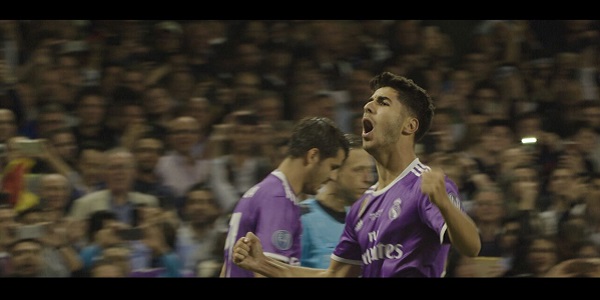
I think it’s really interesting that the episodes are divided up according to the positions people play on the field. Was that something you were thinking about doing from the very beginning, or is that something that happened as you were getting footage and it started to come together?
David Worthen Brooks: We were looking for the story in it, and there were a number of things that presented themselves. The decision to structure by position on the field came about as we were thinking about how this would be broadcast on network TV and we would be talking to a not entirely soccer-oriented audience. People who might be asking, why am I interested in [Brazilian defender] Marquinhos? He never scores any goals. Well, he’s one of the best defenders in the world, and this is what it means to be a defender.
One of the themes that came up was that these young men at a very early age, a lot of them have shown their mettle because they’ve had to deal with huge life events that even someone of my age would find difficult. They’ve lost their parents or dealt with huge displacements in their lives. That could have been our central theme but that was more about feeling than the very definite, concrete structure that positions on the field gave us.
This has been in the making for almost three years. Have you been following the same players that entire time?
Mario Melchiot: Yeah, sixty-odd players. We were motivated by the development that was happening, but you had to be patient too. You can’t rush anything. These kids are developing themselves. That was very interesting. I could relate to it a lot. Moments where you get goosebumps, or it brings back memories. We have a goalkeeper who gets injured, and he breaks down, and you see his journey to come back from it — and then he gets injured again. I had some moments in my career, when I broke my foot twice, thinking I would never play again. And I know how dark it gets.
But we also show you how great they are at developing themselves, and how much effort goes into it, and how beautiful it is, when as a young child, you work so hard, you dream about something, and now you’re living the dream at such a young age.
You talk about this goalkeeper getting injured, and then getting injured again, which sounds like someone’s worst nightmare. Especially if they’re trying to get into their national team, it’s really heartbreaking. But what would you say is a super-satisfying moment in the series that would make people want to stand up and cheer?
David Worthen Brooks: There’s an interview with a father who takes out his cell phone and says, “I always carry this with me.” And he plays this clip. This is an English guy, and his son is playing at [England’s national stadium] Wembley and he scores a goal. It’s one of the lower leagues, a League One promotion playoff. But still, he’s playing it and he knows all of the words of the announcers. You can tell he’s showed this to hundreds of people. It’s like he’s singing along to a piece of music. And he talks about how seeing his son score at Wembley is one of the most miraculous things in his life. It’s a beautiful, touching moment.
Mario Melchiot: There is a Nigerian player, Moses Simon. Great player. Moved over to Europe, now he’s playing in Belgium for Gent. When I called him and told him about what we were doing, the conversation with him was so nice because I didn’t speak with his agent, I spoke directly with him. The guy was so polite, so nice to talk to, and I said, “It’s going to be a couple of years, and it’s going show who you really are as a player. Making it to the World Cup, if your country makes it, it’s the best journey, and you can tell the world what it takes.” And he said, “Mario, I agree, I would love to do it.” It didn’t take him long to decide to do it.
So he tells this story, and I’m only going to tell you a little bit of it, where he’s in Nigeria and his dad always beating him up. He shows his shins, showing how many marks he has on them, and says his dad tried to break his legs. Because the dad was a player too, and he never got anything out of it, so he said, my son needs to study so he can be smart and become a businessman, be successful. So, he would hide his shoes, buried somewhere far away from home, and when the dad wasn’t aware of it, he would unbury the shoes, put them on, go and practice, and bring them back again so the dad didn’t see it. Imagine how dedicated and motivated you have to stay when your family is against it but you believe in it. Now, the dad says, I am so proud, I am so happy that my son achieved it.
David Worthen Brooks: We filmed the father going to see his son play, the first time he had seen his son play live. It’s an amazing moment.
Mario Melchiot: And he says about the dad, I love my dad to death. Anything he did to me will never overtake what he has given to me because he has given me life. I’m building a house, they don’t know about it, but I’m building it and they’re going to go in it. [laughs]
As far as following these guys around for a couple of years, what was the scheduling like for that? You mentioned Dele Alli, he’s a huge star right now, he’s had a couple of great seasons in a row. How do you find time to follow Dele Alli around?
Mario Melchiot: For me, as a player, what I brought to it was making sure that when we started to talk with them, that the agreement would be satisfying to the player, in that we would protect them and not expose them in a bad way. It’s all about trust. If you build trust, they will give you the access. When you don’t build trust, they get a bit worried about it.
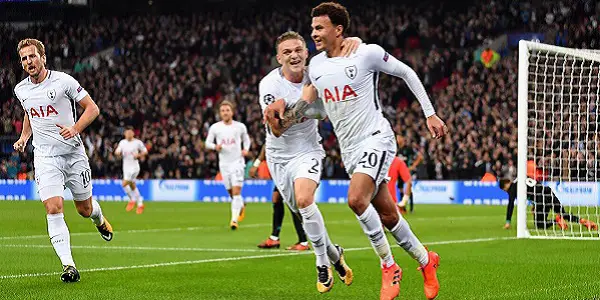
I imagine that having a former player on board was really key in building that trust.
David Worthen Brooks: Absolutely key, to be able to speak their language. And then, it just takes time. You can plan this stuff, but you also have to roll with the punches.
So in addition to the five-part miniseries, you’re doing regional specials and a feature film. How does the feature film differ from the miniseries?
David Worthen Brooks: The feature film is about the passion without any mediation, without any commentary, without any experts giving their point of view. It just shows a set of parallel lives and how they converge, and the thematics are universal. The feature takes us on a journey that ends up expressing the primary importance in our life of human relationships, and support from others, whether it is your family, your team, a coach, a doctor. That is something that transcends them being players, transcends race, all of it. And we get this swelling feeling at the end of the film about connection with each other. That is the most lyrical of all the renditions of the stories.
It is woven out of stories from the regional specials. The most intense one is probably the Dutch one because that is a young director who really lived and breathed with the young players. And the most epic is probably the Russian one. Their whole propaganda machine — even though they were operating on the same budget as everyone else — maybe the dollar goes further in Russia…
You would think that potentially shooting in Russia for something like this could be more difficult, because the whole country really has something to prove with this, and I imagine they could get very…controlling.
David Worthen Brooks: We had two options. One, what I would consider an expat director who was from Russia but educated at an Ivy League school and set up a production company with business going back and forth between Moscow and New York. Very talented guy, great filmmaker. But we decided to go with an equally talented filmmaker who is in the production company who made all of the official Sochi Olympics documentaries. The executive producer was deeply connected and the kind of access we got, we didn’t have to fight. The scale of what they did was unbelievable.
So, for the different countries, did you try to get directors from that background? Was that crucial?
David Worthen Brooks: Football-mad sports documentary directors in each of the countries.
Mario Melchiot: More than just a fan. Because we didn’t want just a fan, we wanted someone who could bring out the human side. We didn’t want just a soccer story.
Well, talking about soccer and guys we’re probably going to be seeing in the World Cup, what would your prediction be for who’s going to win the World Cup?
Mario Melchiot: I mean, Holland is not going and I am a Dutch guy. But Diego Maradona has always been one of my idols on the field, so I will always have a little sensitivity for Argentina. Also, I think in a dream, back in the day, I woke up and I was a Brazilian. They had such a downfall, but I love Brazil. If they turn around and they can make it happen, the Brazilians are key. And then you can never doubt the Germans.
See, I’m part German so I am always very for the Germans.
David Worthen Brooks: I know I’m going to be once again disappointed by England, so that’s going to happen. But what about Belgium? What about all the amazing players they have across all these leagues?
Right, they really have a golden generation of players right now. You never know.
Mario Melchiot: The only key thing the Belgians need, is do they have a leader who can pull them all together, and when the chips are against them, can pull them all up and say, here, do it like this. That’s what they’re missing.
They need someone who has that mental strength who can pull them up when they are down. Like how in 2014, the Germans had Mertesacker.
Mario Melchiot: The Germans look like they all already have that. I think that Germans, when they wake up as children, when they are one year old, their dad goes “Never give up, never give up, never give up…”
Speaking of which, I saw that one of the guys you followed was [German midfielder] Leon Goretzka, who is just massively talented. I’m disappointed that he’s going to Bayern Munich because I wonder how much playing time he’s going to get there with all those other guys, but I imagine that because of that, his journey must have been very interesting.
Mario Melchiot: When you are a player, if you take the easy route, it’s very hard to succeed and qualify as one of the best. He’s not taking the easy route. He’s taking the hardest route. And you know why? Because you have to believe in your own strength first, and then worry about the rest. Not the other way around. If he looks at Bayern and says, “I want to go to Bayern, but I am going to stay at Schalke,” he will never succeed. Because he’ll always be in the comfort zone. But he’s going out of his comfort zone because he wants to be qualified as one of the best and play with the best. That’s why he’s going to Bayern.
Film Inquiry thanks Mario Melchiot and David Worthen Brooks for their time.
Phenoms will premiere on Friday, May 25 at 8:00 pm ET/PT on FOX with two episodes airing back to back, “Attackers” and “Defenders. “Goalkeepers,” will air on Friday, June 1, at 9 p.m. ET/PT. “Playmakers” and “Creators” will air back-to-back on Friday, June 8 at 8:00 pm and 9:00 pm ET/PT.
Does content like this matter to you?
Become a Member and support film journalism. Unlock access to all of Film Inquiry`s great articles. Join a community of like-minded readers who are passionate about cinema - get access to our private members Network, give back to independent filmmakers, and more.
Lee Jutton has directed short films starring a killer toaster, a killer Christmas tree, and a not-killer leopard. Her writing has appeared in publications such as Film School Rejects, Bitch: A Feminist Response to Pop Culture, Bitch Flicks, TV Fanatic, and Just Press Play. When not watching, making, or writing about films, she can usually be found on Twitter obsessing over soccer, BTS, and her cat.













